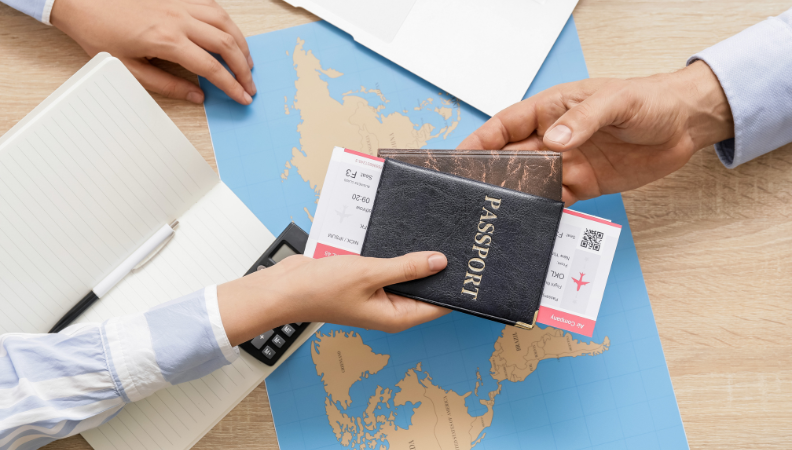Crucial Documents Required for Overseas Travel
International travel is an exhilarating adventure, but it can be brought to a screeching halt or even result in cancellations if you are not equipped with the proper documents. Whether for tourism, work, or educational purposes, possession of the requisite paperwork guarantees seamless travel. Below are the basic documents you need to carry on international travel.
Passport
The most critical document to have for foreign travel is an active passport. Make sure:-
Firstly, ensure your passport is still valid for at least six months after your return date. Additionally, it should contain sufficient blank pages for visa stamps. Moreover, make sure it is not damaged or expired, as this could lead to issues at immigration. Furthermore, certain countries require passports with two or more blank pages. Lastly, always consult entry requirements before traveling to avoid complications.
Visa
You might need a visa depending on your destination and nationality. Visa types are:-
Tourist Visa – For recreational travel.
Business Visa – For business-related travel.
Student Visa – For studies.
Work Visa – For working in another country.
Visa-free entry, e-visa, or visa-on-arrival is available in some countries. Always check visa requirements well ahead of time.
Flight Tickets
The majority of immigration officers need proof of an onward or return flight. Be sure to:-
Hold a printed or electronic copy of your flight ticket.
Have onward travel proof if traveling to a visa-on-arrival destination.
Ensure that your ticket coincides with your visa validity.
Some embassies need reservations of confirmed flights prior to approval of visas, so check advance requirements.
Travel Insurance
Travel insurance is needed in many countries on entry. It must cover:-
Medical emergencies and hospitalization.
Trip cancellations or interruptions.
Lost luggage or travel delays.
Schengen nations, for instance, demand travel insurance that has a coverage of at least €30,000.
Accommodation Proof
Officialdom may question where you’ll be staying in your destination country. Valid proofs are:-
Hotel reservations.
Host’s invitation letter (if staying with family or friends).
Long-term rental contracts.
Hotels may require bookings for the entire stay in some countries to get visas approved.
Evidence of Means of Support
To establish that you can sustain yourself while abroad, you might need:-
Bank statements recent enough.
Credit card statements.
Sponsorship letter (in case someone else is paying your trip).
Traveler’s checks.
Schengen nations, for instance, need to be shown a minimum daily maintenance allowance, which differs from country to country.
COVID-19 and Health-Related Documents
After the pandemic, there might still be requirements in some countries for:-
Firstly, ensure you have your vaccination certificates, as some countries require them for entry. Moreover, carrying negative PCR test results may be mandatory depending on your destination. In addition, health declaration forms might be needed for immigration clearance. Furthermore, requirements can change frequently, so staying updated is crucial. Lastly, always refer to current health guidelines before travel to avoid any issues.
Driver’s License and International Driving Permit (IDP)
If you intend to drive overseas, you might need:-
Your valid driver’s license from your home country. An International Driving Permit (IDP), for instance, is compulsory in some countries. Moreover, some car hire firms additionally require both documents. Therefore, it pays to check ahead of time. Ultimately, being prepared can save you from unexpected issues.
Copies of Important Documents
Keeping photocopies or digital copies of key documents is strongly advised. Copy:-
Firstly, ensure you have copies of your passport (visa page and main page) for identification. Moreover, a travel insurance policy is essential for unforeseen emergencies. In addition, keep hotel reservations and air tickets accessible for verification. Furthermore, having emergency contact details readily available can be lifesaving. Lastly, store these documents in different places, such as hard copies and cloud storage, for security.
Emergency Contact and Local Embassy Details
Prior to traveling, write down:-
Embassy or consulate contact details of your home country at your destination.
Local authorities and family contact emergency numbers.
Addresses of clinics or hospitals in the event of medical emergencies.
Final Tips
Double-check the visa and entry requirements of your destination country at all times.
Have both physical and electronic copies of your documents. First of all, it ensures you have backups in case of loss. Moreover, some authorities may accept digital versions, while others require physical copies. In addition, having both formats can speed up verification processes. Furthermore, it provides peace of mind during your travels. Finally, this simple step can prevent unnecessary stress. Store your documents for international travel in a safe travel folder for easy retrieval. By having all these necessary documents ready, you can have a smooth international trip. Safe travels

